13 Best OneUp Alternatives in 2025 (Free & Paid)

Table of Contents
Social media management demands efficiency, consistency, and the right tools. While OneUp offers scheduling capabilities, exploring OneUp alternatives gives you access to diverse features, pricing models, and platform support. These tools help businesses streamline content creation, maintain consistent posting schedules, and analyze performance across multiple channels without manual intervention.
1. RecurPost

RecurPost stands out as a robust social media scheduler that emphasizes content recycling and automation. When comparing RecurPost VS OneUp, RecurPost offers superior content library management with unlimited categories on higher plans, while OneUp limits this functionality. The platform enables businesses to maintain consistent social media presence by automatically recycling evergreen content across Facebook, Instagram, LinkedIn, X (Twitter), Pinterest, Google Business Profile, TikTok, YouTube, Threads, and Bluesky.
Key Features
- Evergreen content libraries allow automatic post recycling across unlimited categories on Agency plans
- Bulk scheduling via CSV upload enables uploading hundreds of posts simultaneously
- AI-powered best time recommendations analyze audience engagement patterns for optimal posting
- White-label reporting with custom branding for agencies managing multiple clients
- Social inbox centralizes messages, comments, and notifications from Instagram, Facebook, LinkedIn, and X
Pricing Plans
Starter
Personal
Agency
Pros
- RecurPost excels with affordable pricing starting at just $90 yearly for individuals.
- Content categorization keeps your posts organized across different themes.
- The platform supports ten social platforms with direct publishing.
- AI content generation accelerates caption writing.
- RSS feed integration pulls blog content automatically. Users praise the responsive customer support team.
- The visual content calendar simplifies planning.
- Analytics track performance across all connected accounts.
Cons
- RecurPost's Starter plan limits users to two social accounts.
- Advanced features require upgrading to higher tiers.
- Some users report occasional disconnection from social networks.
- The mobile app lacks certain desktop features.
- The learning curve exists for new users unfamiliar with content libraries.
- Instagram Stories scheduling requires manual posting through a mobile app.
- Team collaboration features only available on Agency plans.
- Historical analytics data limited to three months on Bootstrap plan.
2. Buffer
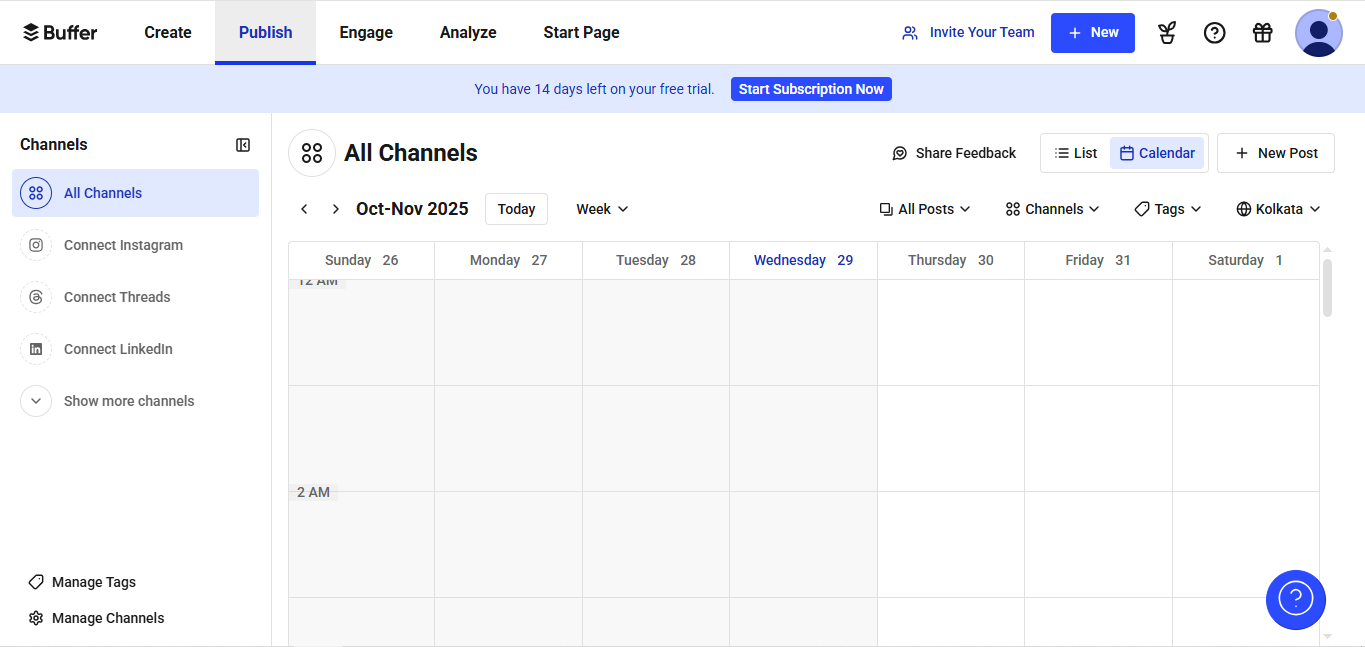
Buffer simplifies social media scheduling with an intuitive interface designed for individuals and teams. In the Buffer VS OneUp comparison, Buffer provides superior team collaboration features with unlimited users on Team plans, while OneUp charges extra for additional team members. The platform supports Facebook, Instagram, X (Twitter), LinkedIn, TikTok, Pinterest, Bluesky, Threads, Mastodon, Google Business Profile, and YouTube Shorts.
Key Features
- AI Assistant generates captions and refines content across all paid plans
- Queue management organizes posts for automatic publishing at scheduled intervals
- First comment scheduling adds hashtags or links as initial comments on Instagram and LinkedIn posts
- Analytics dashboard tracks performance with 30-day history on free plans and unlimited on paid plans
- Custom UTM parameters monitor traffic sources and campaign performance
Pricing Plans
- Free Plan: $0/month. Includes 3 channels, 10 scheduled posts per channel, 100 content ideas, 1 user account, AI Assistant included, basic analytics (30-day history), and world-class customer support.
- Essentials Plan: $60/year ($5/month per channel). Includes unlimited scheduled posts per channel, unlimited content ideas, 1 user account, AI Assistant included, advanced analytics with unlimited history, engagement inbox for comments, hashtag manager, first comment scheduling, and custom video covers.
- Team Plan: $120/year ($10/month per channel). Includes all Essentials features, unlimited user accounts, content approval workflows, custom access levels and permissions, branded reports with logos, and advanced team collaboration tools.
Pros
- Buffer offers a forever-free plan for three channels.
- The interface remains clean and beginner-friendly.
- AI Assistant improves content quality with unlimited credits on paid plans.
- Channel groups simplify bulk posting across profiles.
- Hashtag manager saves frequently used tags.
- Advanced analytics provide detailed insights on Essentials and Team plans.
- Custom reports help track ROI.
- Integration with Canva streamlines visual content creation.
Cons
- Buffer's free plan restricts scheduling to ten posts per channel.
- Additional channels cost $5 monthly on Essentials and Team plans.
- Branded reports only available on Team plan.
- No built-in content recycling for evergreen posts.
- RSS feed integration requires third-party tools.
- Approval workflows restricted to Team plan users.
- Some platforms like X require premium profiles for full analytics.
- Phone support not offered at any tier.
3. Sprout Social
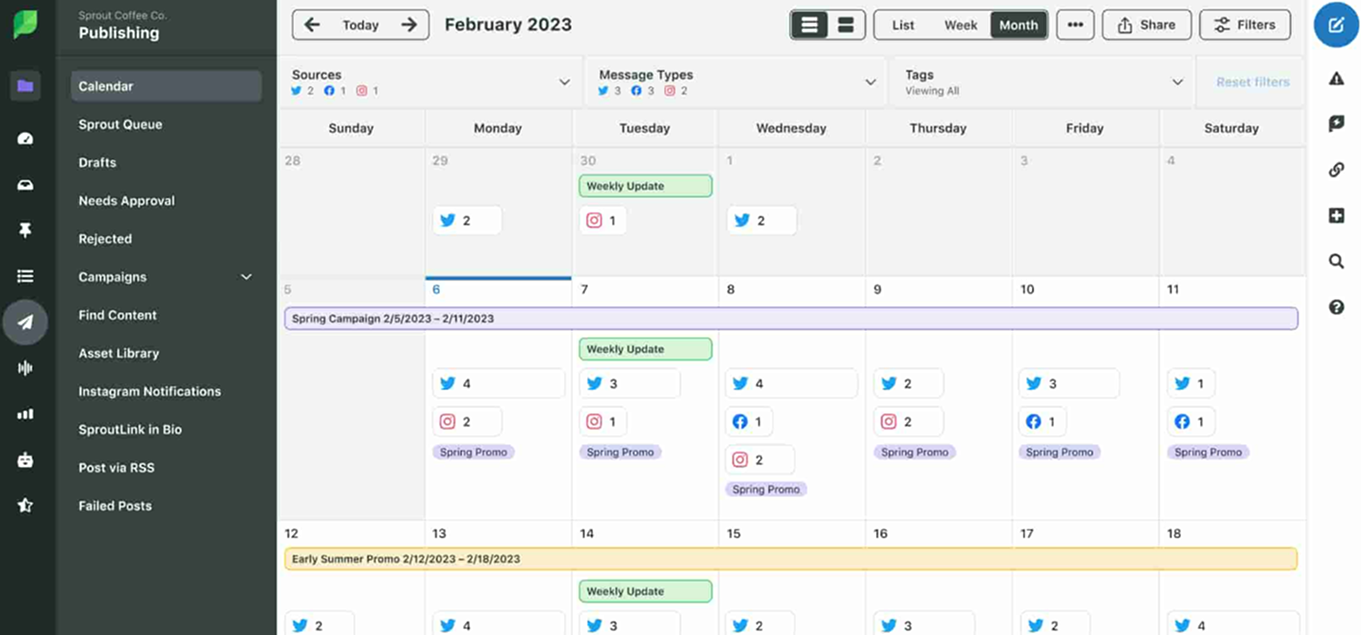
Sprout Social delivers enterprise-grade social media management for organizations requiring comprehensive features. Evaluating Sprout Social VS OneUp reveals Sprout’s advanced analytics, social listening, and customer care tools far exceed OneUp’s capabilities. The platform manages Facebook, Instagram, X (Twitter), LinkedIn, Pinterest, TikTok, YouTube, and Reddit accounts.
Key Features
- Smart Inbox consolidates messages across all connected platforms for unified response management
- Message Spike Alerts notify teams about unusual activity spikes requiring immediate attention
- AI-generated alt text creates accessibility descriptions for images automatically
- Competitor analysis tracks rival brands' performance and content strategies
- Optimal send times recommend best posting schedules based on historical engagement data
Pricing Plans
- Standard Plan: $199/seat/month. Includes 5 social profiles, all publishing and engagement features, unlimited AI alt text, group/profile/post-level reporting, and review management.
- Professional Plan: $299/seat/month. Includes unlimited social profiles, message tagging, competitor/tag/paid insights, optimal send times, AI Enhance Post feature, and competitive benchmarking.
- Advanced Plan: $399/seat/month. Includes all Professional features, AI Enhance Reply, sentiment detection, Sprout API, helpdesk integrations, team productivity reports, and message spike alerts..
- Enterprise Plan: Custom pricing. Includes tailored enterprise solutions, white-glove onboarding, dedicated service, SSO setup, and priority support. Add-ons: Premium Analytics, Social Listening, Employee Advocacy, and Professional Services. 30-day free trial available, no credit card required.
Pros
- Sprout Social provides robust enterprise features for large teams.
- Advanced reporting capabilities track detailed metrics.
- Social listening monitors brand mentions across platforms.
- Customer care reports measure response times.
- Team collaboration tools include role-based permissions.
- Integration with CRM systems connects social data.
- White-glove onboarding assists Enterprise clients.
- Priority support resolves issues quickly.
Cons
- Sprout Social's pricing starts at $199 monthly per seat.
- No free plan available for testing.
- The learning curve is steep for new users.
- Its interface is simple, but not the sleekest
- Small businesses find costs prohibitive.
- Additional features require purchasing separate add-ons.
- Social listening and premium analytics cost extra.
- Setup complexity demands dedicated training time.
- Minimum seat requirements apply for certain plans.
4. Planable
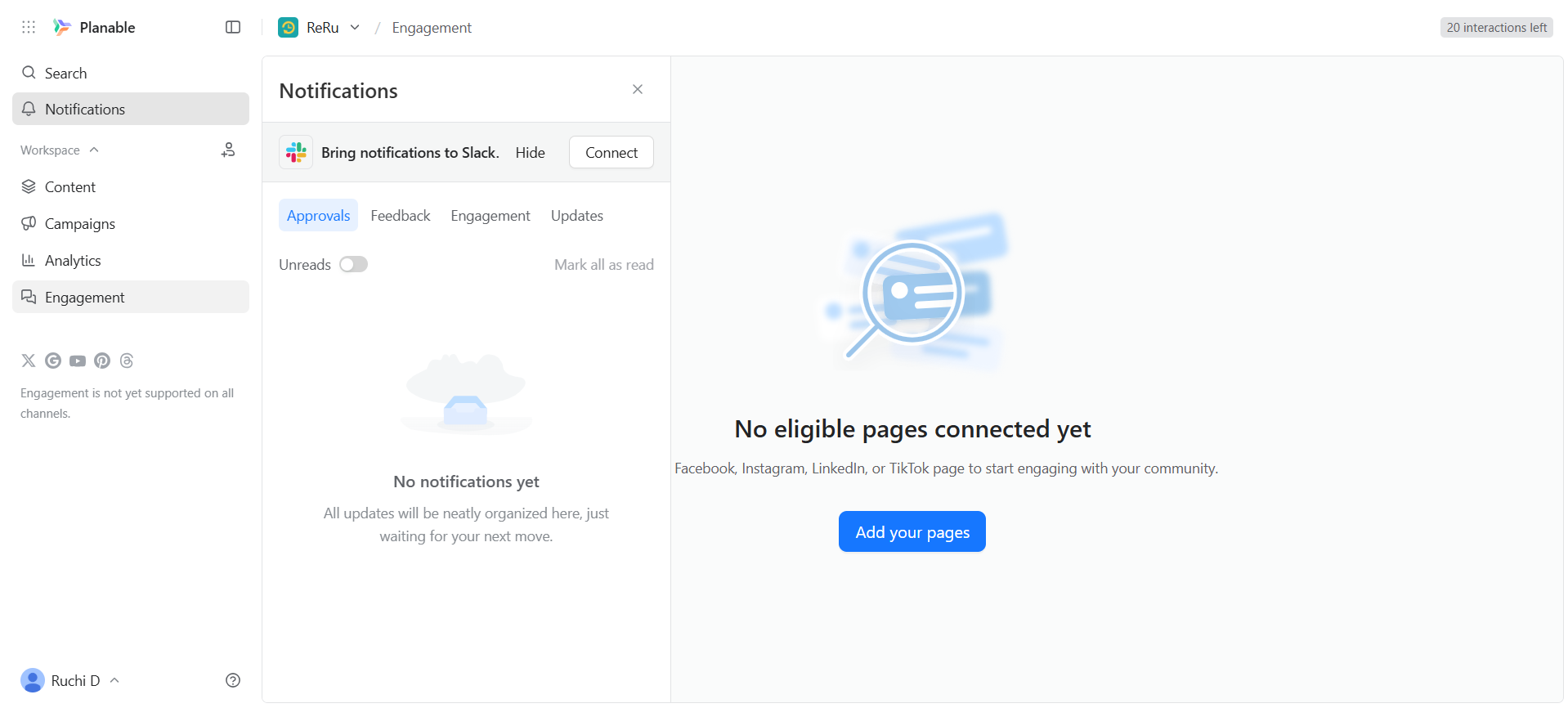
Planable focuses on collaborative content approval workflows for marketing teams and agencies. Comparing Planable VS OneUp shows Planable’s visual planning interface and multi-level approvals outperform OneUp’s basic scheduling. The platform publishes to Facebook, Instagram, LinkedIn, X (Twitter), YouTube, Google Business Profile, TikTok, Pinterest, and Threads.
Key Features
- Feed Calendar and Grid views provide visual content planning across platforms
- Multi-level approval workflows enable review processes for sensitive content
- Campaign organization groups related posts with strategy briefs and resources
- Text annotations allow inline commenting on specific content sections
- Bulk approval processes multiple posts simultaneously for efficiency
Pricing Plans
- Free Plan: $0. Includes 50 total posts (lifetime cap), unlimited experience, no X (Twitter) publishing, and no analytics.
- Basic Plan: $33/month (annual billing). Includes 60 posts per workspace per month, unlimited users, 4 social pages per workspace, 2 types of approval, feed & calendar views, 3 campaigns per workspace, with analytics ($9/workspace/month) and engagement add-on ($5/workspace/month).
- Pro Plan: $49/month (annual billing). Includes 150 posts per workspace per month, unlimited users, 10 social pages per workspace, 3 types of approval, feed, calendar, & grid views, 10 campaigns per workspace, with analytics ($9/workspace/month) and engagement add-on ($5/workspace/month).
- Custom Plan: Contact for pricing. Includes unlimited posts, multi-level approvals, feed, calendar, grid & list views, dedicated account manager, unlimited campaigns, SSO integration, and add-ons for analytics & engagement.
Pros
- Planable excels at visual content planning with multiple view options.
- Collaboration features streamline team workflows effectively.
- Multi-level approvals suit agencies with complex review requirements.
- Campaign management keeps strategy organized.
- Built-in media editor provides basic editing capabilities.
- Universal content supports blog posts and newsletters.
- Client-friendly interface simplifies approval processes.
- The free plan offers 50 total posts for testing.
Cons
- Planable's monthly post limits reset each month.
- Basic plan restricts X (Twitter) publishing to one tweet per day.
- Analytics and engagement features require paid add-ons.
- No built-in content recycling capabilities.
- RSS feed integration not available.
- Limited automation features compared to competitors.
- Storage limits apply to media libraries.
- Published posts archived after 13 months on lower plans.
5. Post Planner
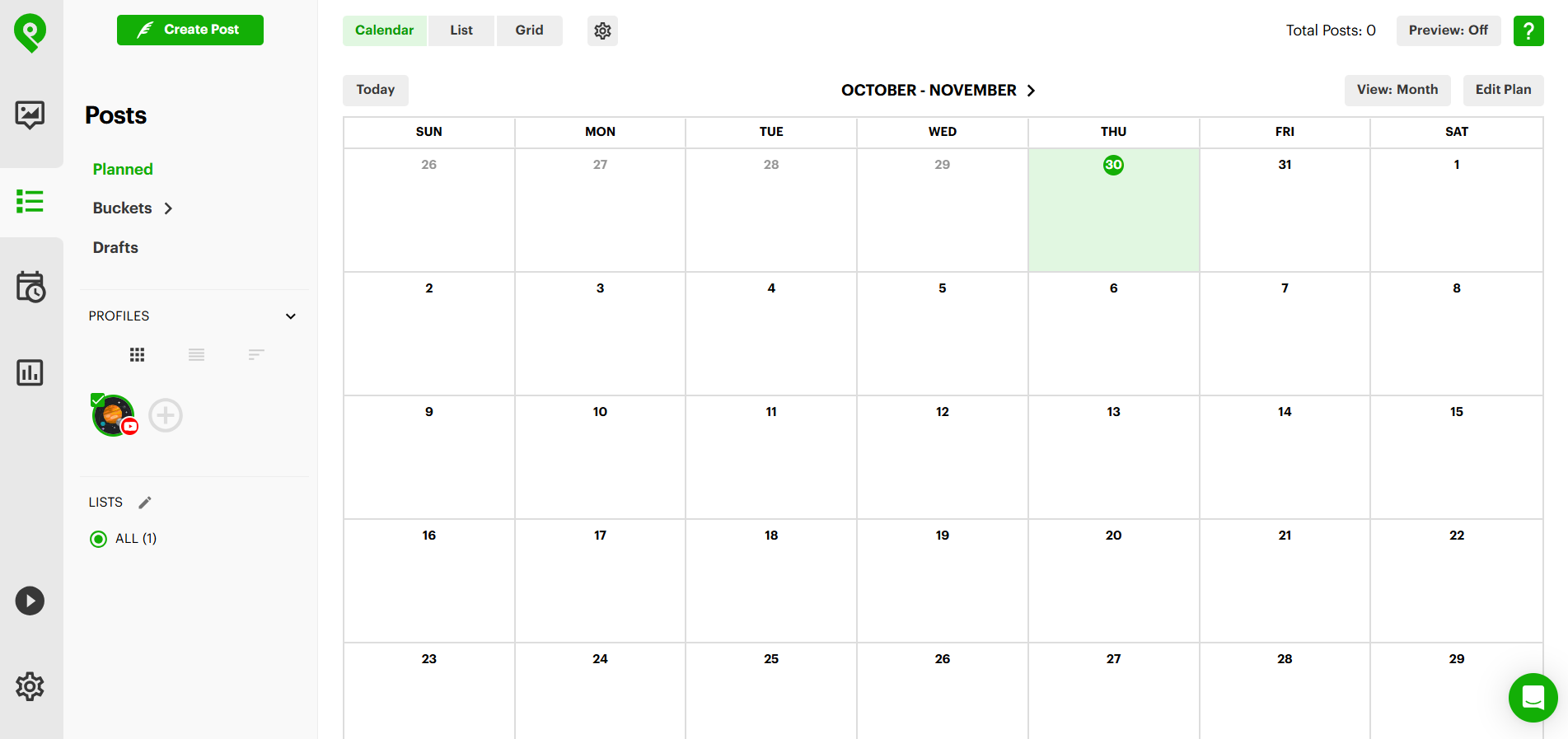
Post Planner combines scheduling with content curation to help businesses discover engaging posts. In the Post Planner VS OneUp analysis, Post Planner’s content discovery engine and viral media curation differentiate it from OneUp’s pure scheduling focus. The tool supports Facebook, Instagram, Google Business Profile, LinkedIn, Pinterest, TikTok, X (Twitter), and YouTube.
Key Features
- Content curation discovers viral media images videos and texts from social networks
- AI credits generate hashtags captions and content daily based on plan limits
- Post recycling automatically reshares evergreen content on recurring schedules
- Bulk upload schedules up to 1000 posts simultaneously on Growth plan
- Analytics tracks historical post performance with engagement comparisons
Pricing Plans
- Free Plan: Yearly billing: $0. Includes 1 social account, 1 user, 15 scheduled posts, 3 daily posts per account, 100 AI credits daily, basic scheduling features, post recycling, copying, shuffling, bulk upload and buckets, basic content curation features (curating up to 7 days old social articles), and email & chat support.
- Starter Plan: Yearly billing: $84 ($7/month). Includes 3 social accounts, 1 user, 150 scheduled posts, 12 daily posts per account, 1,000 AI credits daily, basic scheduling features, and email & chat support.
- Growth Plan (Most Popular): Yearly billing: $444 ($37/month). Includes 12 social accounts, 2 users, 1,000 scheduled posts, 18 daily posts per account, 20,000 AI credits daily, premium scheduling features, content curation features (curating viral media, images, videos, gifs, etc.), full analytics, and email & chat support.
- Business Plan: Yearly billing: $684 ($57/month). Includes 25 social accounts, 5 users, 5,000 scheduled posts, 24 daily posts per account, 40,000 AI credits daily, premium scheduling features, and full analytics, with email & chat support.
Pros
- Post Planner excels at content discovery saving research time.
- Viral content suggestions boost engagement rates.
- AI-powered content generation accelerates caption writing.
- Post recycling keeps feeds active with minimal effort.
- Affordable pricing starts at $84 yearly.
- Content streams save curated sources for easy access.
- Calendar view organizes scheduled posts visually.
- Media editing integrates with Studio and Canva.
Cons
- Post Planner's free plan limits scheduled posts to 15 total.
- Daily AI credits restrict content generation on lower tiers.
- Growth plan required for premium curation features.
- Analytics only available on Growth Business and Enterprise plans.
- Three daily posts per account limit on free plan.
- Content older than seven days requires premium plans.
- Team collaboration features are limited compared to competitors.
- A learning curve exists for content curation workflows.
6. Facebook Creator Studio

Facebook Creator Studio offers native scheduling and management for Facebook and Instagram accounts completely free. When evaluating Facebook Creator Studio VS OneUp, Creator Studio’s zero cost and direct platform integration appeal to Meta-focused creators, though it lacks multi-platform support OneUp provides. The tool exclusively manages Facebook Pages, Facebook Groups, Instagram Business accounts, and Instagram Creator accounts.
Key Features
- Content Library organizes all published and scheduled posts by type including photos videos Stories and Reels
- Sound Collection provides thousands of free music tracks and sound effects for video content
- Monetization tools track eligibility status and earnings from Facebook and Instagram content
- Rights Manager protects copyrighted content using reference files to detect unauthorized usage
- Insights Dashboard displays comprehensive analytics for audience engagement reach and demographics
Pricing Plans
- Free Plan: Monthly: $0 | Yearly: $0. Includes content management for Facebook and Instagram business pages, content creation and publishing, scheduling posts, insights and analytics, comment and inbox message management, monetization features for eligible content. No paid tiers available.
Pros
- Facebook Creator Studio costs nothing making it accessible to everyone.
- Direct platform integration ensures reliable publishing without third-party risks.
- Sound collection offers legal music and effects for videos.
- Monetization features help creators earn revenue.
- Insights provide detailed Facebook and Instagram analytics.
- The content library keeps all posts organized efficiently.
- Live dashboard monitors real-time streaming performance.
- Native tool eliminates API connection issues.
Cons
- Facebook Creator Studio only supports Meta platforms limiting multi-network management.
- No X (Twitter) LinkedIn Pinterest or TikTok integration available.
- Scheduling features less advanced than dedicated tools.
- Team collaboration capabilities are minimal compared to competitors.
- No content recycling for evergreen posts.
- Bulk scheduling functionality limited.
- Analytics export options restricted.
- Interface less intuitive than specialized scheduling tools.
7. Metricool

Metricool provides comprehensive analytics alongside scheduling for data-driven social media strategies. Comparing Metricool VS OneUp highlights Metricool’s superior analytics and competitor tracking versus OneUp’s basic reporting. The platform connects to Facebook, Instagram, X (Twitter), LinkedIn, Pinterest, TikTok, YouTube, Twitch, Google Business Profile, Threads, and Bluesky.
Key Features
- Competitor analysis tracks up to 100 competitor profiles on Starter and Advanced plans
- SmartLinks creates customizable link-in-bio pages with unlimited links and analytics
- Looker Studio integration connects data for advanced custom reporting dashboards
- Hashtag analysis evaluates hashtag performance and engagement on X and Instagram
- AI Social Media Assistant generates content ideas and scheduling recommendations
Pricing Plans
- Free Plan: Yearly: $0. Includes management of 1 brand with all social media accounts (excluding LinkedIn and Twitter), planning up to 50 pieces of content per month, analysis of 5 competitor profiles, access to analytics with 3 months of historical data, and AI social media assistant.
- Starter Plan (5 brands): Yearly billing: $216 ($18/month). Includes management of all brands' social media accounts (excluding Twitter), unlimited content scheduling, LinkedIn connection, analysis of 100 competitor profiles, downloadable reports, multiple links-in-bio with SmartLinks, and access to AI social media assistant.
- Advanced Plan (15 brands): $39Yearly billing: $540 ($45/month). Includes all features of Starter plan plus unlimited team/client access, role management, post approval system, customizable report templates, Looker Studio, Zapier and Make integration, AI assistant adjustments, MCP AI connection, and API access.
- Custom Plan (15 brands): Monthly: Contact for pricing | Yearly: Contact for pricing. Includes starting from 50 brands, all features of the Advanced plan, custom number of brands, and customized publication limits.
Pros
- Metricool offers a forever-free plan for one brand.
- Comprehensive analytics track unlimited historical data on paid plans.
- Competitor monitoring provides strategic insights.
- SmartLinks replace traditional link-in-bio tools.
- PDF and PPT report exports simplify client presentations.
- Canva and Google Drive integrations streamline workflows.
- Unlimited scheduling on premium plans removes posting limits.
- API access enables custom integrations on Advanced plan.
Cons
- Metricool's free plan excludes LinkedIn and X (Twitter) connections.
- Each X account requires a $5 monthly add-on fee.
- Custom report templates only on Advanced plan.
- Team collaboration limited to Advanced and Custom plans.
- Hashtag tracker costs $25 per day per platform.
- A learning curve exists for advanced features.
- Some analytics features feel overwhelming for beginners.
- White-label options only on Custom plan.
8. CoSchedule
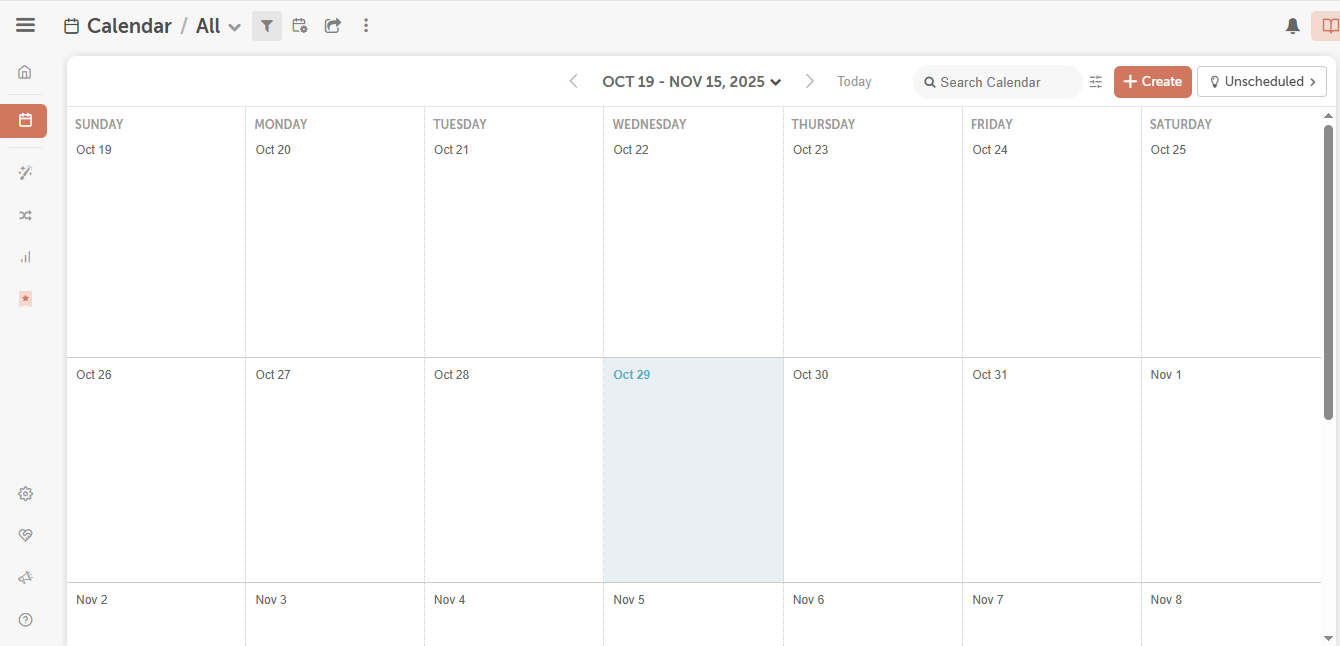
CoSchedule integrates social media scheduling with comprehensive marketing calendar management. The CoSchedule VS OneUp comparison shows CoSchedule’s project management capabilities and AI tools exceed OneUp’s scheduling-only approach. The platform schedules content to Facebook, Instagram, X (Twitter), LinkedIn, Pinterest, and YouTube.
Key Features
- Marketing Calendar centralizes all content projects campaigns and social posts in unified view
- ReQueue automation recycles top-performing social content automatically
- Best Time Scheduling publishes posts when audience engagement peaks based on historical data
- AI Social Assistant generates captions with unlimited usage on paid plans
- Social Inbox manages Facebook and Instagram messages on free plan all networks on paid tiers
Pricing Plans
- Free Calendar: Yearly billing: $0. Includes 1 user, 1 social profile, up to 15 social messages, limited AI social assistant with 20 prompts, basic features including drag-and-drop content calendar, customizable color coding, and social sync.
- Social Calendar: Yearly billing: $228 ($19/month). Includes up to 3 users, 3 social profiles ($5/mo for each additional profile), unlimited social messages, unlimited AI social assistant with 1,600+ prompts, social message optimizer, reusable social templates, link in bio, and email & chat support.
- Agency Calendar: Yearly billing: $708 ($59/month). Includes up to 3 users, 5 social profiles ($5/mo for each additional profile), social calendar features plus custom client calendars, client brand profiles, custom project types, custom fields, marketing campaigns, Kanban dashboard, and table view.
- Content Calendar: Monthly: Call for pricing | Yearly: Call for pricing. Includes up to 5 users, 5 social profiles (additional profiles can be added), custom sub-calendars, marketing campaigns, Kanban dashboard, table view, and custom fields.
- Marketing Suite: Monthly: Call for pricing | Yearly: Call for pricing. Includes custom user limits, 5 social profiles (additional profiles can be added), team management dashboard, team performance reports, digital asset management dashboard, project intake request forms, custom permissions, and single sign-on (SSO).
Pros
- CoSchedule combines social scheduling with project management effectively.
- Marketing calendar provides a holistic content planning view.
- AI tools generate captions and optimize content.
- ReQueue automation saves time recycling the best posts.
- Bulk scheduling handles multiple posts efficiently.
- WordPress integration publishes blog content directly.
- Fair pricing with 20 percent discount on annual plans.
- Multiple calendar solutions for different team sizes.
Cons
- CoSchedule's free plan allows only one user and 15 scheduled posts.
- Social Calendar limits teams to three users maximum.
- X (Twitter) profiles cost $8 monthly extra per account.
- Advanced features require Content Calendar or Marketing Suite.
- Learning curve steep for full platform utilization.
- Mobile apps lack some desktop capabilities.
- Lower-tier plans restrict social profiles significantly.
- Analytics features are less robust than specialized tools.
9. Postfity

Postfity delivers affordable social media scheduling with AI-powered content creation tools. Analyzing Postfity VS OneUp reveals Postfity’s competitive pricing and bulk scheduling capabilities rival OneUp’s offerings. The tool publishes to Facebook, Instagram, X (Twitter), LinkedIn, Pinterest, TikTok, YouTube, Google Business Profile, and Telegram.
Key Features
- AI content creation generates text images and captions using included monthly credits
- Bulk scheduling uploads multiple posts simultaneously with CSV import support
- External client approval workflow enables clients to review posts before publishing
- First auto commenting schedules initial comments with hashtags or additional content
- Instagram product tagging connects posts to e-commerce products for shopping integration
Pricing Plans
- One Plan: Yearly billing: $20/month. Includes 7 social media accounts, 1 user, AI content creation, 1 AI Brandbook, scheduling calendar, draft posts, social analytics, unified social inbox, internal approval workflow, social insights, link in bio, AI chatbot, 500 GB+ storage, 100K AI words, 100 AI designs, 50 AI videos, 200 mins AI clip, 90 mins AI subtitles, and 5GB storage.
- Growth Plan: Yearly billing: $85/month. Includes 30 social media accounts, 5 users, advanced AI content creation, 7 AI Brandbook, scheduling calendar, draft posts, social analytics, unified social inbox, internal approval workflow, social insights, link in bio, AI chatbot with social integrations, bulk scheduling, external client approval, first auto commenting, Instagram product tagging, private teamspaces, 250K AI words, 500 AI designs, 150 AI videos, 900 mins AI clip, and 450 mins AI subtitles, with 2TB storage.
- Enterprise Plan: Monthly: Contact for pricing | Yearly: Contact for pricing. Includes tailored plan to meet content creation needs, 10 seats, unlimited AI content creation, SSO/SAML support, simplified API access, workflow automations, priority support, training, and white-labeled reporting.
Pros
- Postfity offers competitive pricing with comprehensive features.
- AI Brandbook maintains consistent brand voice across content.
- Bulk scheduling accelerates content calendar management.
- Multiple workspace management suits agencies with various clients.
- External approval workflow simplifies client collaboration.
- Unlimited social inbox centralizes all platform messages.
- Link-in-bio feature replaces dedicated tools. Analytics track performance across connected accounts.
Cons
- Postfity's free plan limits users to seven social accounts.
- AI credits consumed quickly on lower tiers.
- Additional social accounts cost $5 monthly each. Extra users add $10 monthly per person.
- Bulk scheduling requires a $19 monthly add-on.
- Team collaboration features need Agency plan upgrade.
- Analytics depth is inferior to specialized tools.
- Learning resources are less extensive than established competitors.
10. Later
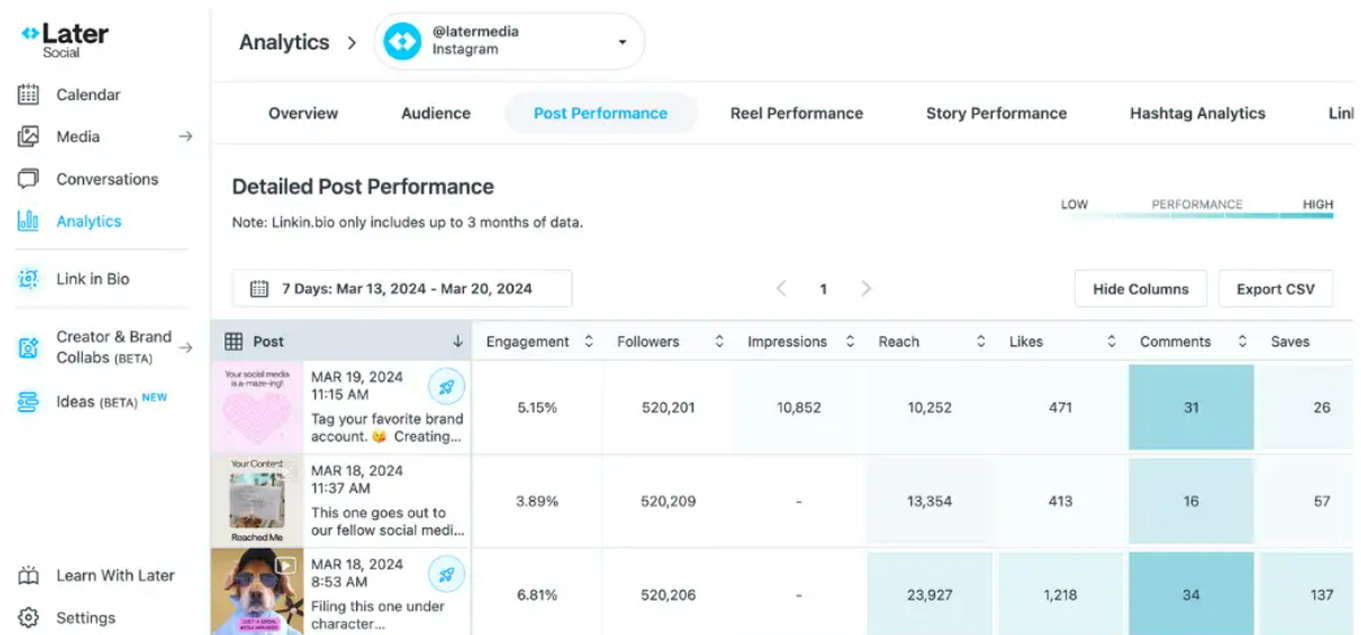
Later is a visual social media scheduler that started with Instagram-first posting in mind. It’s one of the top Sked Social alternatives for anyone who wants to manage Instagram easily, especially small brands, solo creators, and influencers.
Key Features
- Visual Content Calendar: Schedule posts with a drag-and-drop interface, with optional grid preview (for Instagram feed).
- Linkin.bio: Create a shoppable landing page linking to products or content (helpful for e-commerce).
- Instagram Tools: Get hashtag suggestions, schedule your first comment, and use the “best time to post” tips.
- UGC Tools: Save and manage user-generated content for easy reposting (paid tiers).
- Social Inbox (Meta only): Handle Instagram and Facebook comments/messages in middle-tier plans.
Pricing Plans
- Growth: $50/month (2 social sets, 180 posts/month/profile)
- Scale: $110/month (6 social sets with unlimited posts)
Pros
- Simple and visual scheduler
- Instagram tools (grid view, link-in-bio) are a standout
- Best-time posting and UGC workflows support growth
- Quick to learn and easy to use
Cons
- Analytics are limited unless you upgrade
- Better suited to Instagram-first users; other platforms feel secondary
- Posting errors are sometimes reported
- Teams with growing needs may hit feature walls quickly
11. Sendible

Sendible is an agency-oriented platform known for its extensive integrations and customizable dashboards. It’s one of the best Sked Social alternatives for agencies managing many clients, since it offers multi-brand dashboards and even a white-label option on higher tiers.
Key Features
- Smart Queues & Composer: Schedule individual posts or queue content in categories that auto-schedule at set intervals.
- Unified Inbox: View and reply to all messages/comments in one place, plus assign priority to some brands/accounts.
- Integrations: Deep integration with Canva (design posts), Google Drive, Dropbox, and Pexels.
- Reporting & Automation: Build custom reports or use automated recurring reporting. Includes team tasks and approvals.Save and manage user-generated content for easy reposting (paid tiers).
- Client Connect & White Label: HanSecure client access (limited view) and white-label reporting for agencies.
Pricing Plans
- Creator: $29/month (6 profiles, 1 user)
- Traction: $89/month (24 profiles, 4 users)
- Scale: $199/month (49 profiles, 7 users)
- Advanced: $299/month (100 profiles, 20 users)
- Enterprise: $750/month (400 profiles, 80 users)
Pros
- Well-organized dashboard for managing many profiles
- Seamless integrations with content and design tools
- Client-access options and white-label features for agencies
- Easy bulk scheduling and approval workflows
- Flexible plans to grow with your agency
Cons
- Entry plans might feel limited for smaller teams
- Advanced tools sit behind higher-tier pricing
- Interface feels slightly dated in parts
- Some platform limits (like Instagram Stories) depend on API rules
- A few users report slow loads or minor dashboard bugs
12. Oktopost

Oktopost is built for B2B brands that take social selling seriously. Unlike most Sked Social alternatives, it doesn’t just schedule posts but connects social activity with your CRM, tracks leads, and helps employees amplify content. It’s built for enterprise marketing teams that care about pipeline, not just likes.
Key Features
- Social Publishing: Plan and publish posts across LinkedIn, Twitter (X), and Facebook, geared toward B2B marketing.
- Employee Advocacy: Tools for employees to easily share company content to their social profiles.
- Lead Generation Tools: Build gated content campaigns, landing pages, and forms; track every lead from post to CRM.
- Analytics & Social ROI: Reports that connect social activity to pipeline/ROI metrics in CRM.
- Social Listening: Keep tabs on social campaigns and key business topics relevant to your brand.
- Client Connect & White Label: HanSecure client access (limited view) and white-label reporting for agencies.
Pricing Plans
- No free plan: Clearly meant for large companies with serious sales funnels
- Enterprise pricing: $89/Start in the tens of thousands per year for small teams ( 4+ seats)
- Custom quotes only: You’ll need to contact sales to get exact costs
Pros
- Tracks real business outcomes from social posts
- Built-in CRM and Salesforce integrations
- Employee advocacy drives bigger organic reach
- ROI tracking helps justify social media spend
- Strong support for LinkedIn and Twitter
Cons
- Way beyond the budget of most small teams or freelancers
- Limited support for Instagram Stories or visual content
- No freemium tier or public pricing
- Better for lead-gen campaigns than creative content workflows
13. Meltwater

Meltwater is a seasoned player in the media monitoring space that’s evolved into a powerful tool for PR teams, marketers, and communications professionals. For organizations looking beyond basic scheduling, it stands out among Sked Social alternatives for its broad reach and serious listening power.
Key Features
- Cross-Channel Monitoring: Track your brand, competitors, or keywords across social platforms, blogs, podcasts, and global news outlets.
- AI Analytics Dashboards: Measure campaign reach, track share of voice, and visualize sentiment trends over time.
- Influencer Database: Discover, reach out to, and track creators directly through the platform.
- PR Campaign Reporting: Combine social and media impact in one report to share with leadership or clients.
- Real-Time Alerts & Reports: Push updates via Slack, Teams, or email. Custom reports on-demand.Push updates via Slack, Teams, or email. Custom reports on-demand.
Pricing Plans
- No free tier: No free or small-team plans, but free trials or limited demos can be requested.
- Mid-Sized Package: $15,000–$20,000 per year
- Large Enterprise Package: $40,000+/year
Pros
- Best-in-class for monitoring brand mentions and sentiment tracking
- Covers social media + news + forums + blogs
- Excellent for crisis alerts and reputation insights
- Real-time alerts help large PR teams stay ahead
- AI insights assist in share-of-voice reporting
Cons
- Overkill for users who just want to schedule content
- Interface can feel complex or overwhelming
- Post scheduling is basic and limited to a few platforms
- No Instagram or Threads publishing support yet
- Custom pricing puts it out of reach for freelancers or small businesses
What Is Sked Social?
Sked Social (once called ScheduGram) is a social media scheduling tool that kicked off around 2014, originally built with Instagram in mind. Over the years, it expanded to include other platforms as well, but its heart still beats Instagram-first.
While Sked Social was once known for its easy interface, newer reviews point out some friction: missing features like Instagram Story auto-posting, advanced analytics, and video scheduling tools. That’s why many users are now exploring other Sked Social alternatives.
Why Look for Sked Social Alternatives?
If you’re thinking about switching, you’re not alone. Here’s why some users start exploring Sked Social alternatives:
- Post Failures & Sync Issues: Some users experience delays or errors during post scheduling, which disrupts content planning.
- Limited Network Support: While it covers most big platforms, it lacks robust features for newer or niche networks like Threads, or story-first formats.
- Support Complaints: Slow response times and unresolved issues frustrate users relying on real-time content calendars.
- Shallow Analytics: Sked’s reporting tools are considered too basic, especially if you need campaign performance metrics or audience insights.
- Pricing Escalation: Its costs escalate quickly as you add more social profiles or users, making it less affordable for growing teams compared to other Sked Social alternatives.
- Tougher to Learn: Some users say it takes time to get comfortable with the approval workflows, scheduling setup, and user permissions.
All these things push businesses to compare Sked Social alternatives, especially platforms that feel smoother, pack deeper analytics, or cost less to scale.
How to Choose the Right Sked Social Alternative
Picking the best tool depends on what you actually need day to day. Here’s what to consider:
1. Supported Platforms
Check if the tool works with all the networks you use, including Instagram, Facebook, TikTok, LinkedIn, Pinterest, and more. Some tools shine on Instagram but skip out on TikTok scheduling or Pinterest pinning. If you need multi-platform support, this matters.
2. Core Features
Think about your non-negotiables: Do you need evergreen post recycling, a social inbox, content approvals, or better analytics? Choose the Sked Social alternatives that get you what you missed.
3. Team Size & Collaboration
Running social solo? Or working with a team or clients? Some Sked Social alternatives come with shared calendars, approval flows, or workspaces to streamline team content.
4. Posting Volume
Free and budget plans often limit how many posts or profiles you can manage. Check if your chosen platform can handle your content calendar without forcing frequent upgrades.
5. Analytics Depth
Need to track engagement, ROI, or team productivity? Some Sked Social alternatives only show basic stats, while others (like Sprout Social) offer detailed reports and dashboard exports.
6. Integrations
If you use Canva, Google Drive, or a CRM like Zoho, check if your Sked Social alternatives connect with it. A missing integration can slow you down or mess with your workflow.
7. Budget & Scalability
Some tools offer 10 profiles for $10/month. Others charge $100 for the same thing. Make sure the plan you’re looking at gives you enough room to grow, without shocking you at checkout every time you add a new user or client brand.
8. Trials & Support
Try before you commit. Most tools offer a free trial or demo. Also, dig into user reviews: Does the company offer fast, helpful support? If you get stuck, good service makes all the difference.
Use this checklist to sort through the noise and land on the best Sked Social alternatives that fit your budget, goals, and team setup.
Free vs. Paid Sked Social Alternatives
When searching for alternatives, you’ll encounter both free and paid options. Here’s what you need to know:
Free Alternatives
If you’re running on a small budget or just getting started, free Sked Social alternatives that give you the basics might be all you need. For example:
- Buffer’s free plan supports 3 accounts and 10 posts per account
- Zoho Social’s free tier handles 1 brand across 6 platforms
- Publer’s free version lets you manage 3 social profiles, with up to 10 scheduled posts each.
These social media scheduling tools are solid picks for individuals, freelancers, or side hustlers. The trade-off? You’ll often hit limits fast, like no team features, post caps, and minimal analytics. Still, they’re great for testing an interface before committing.
Paid Alternatives
When social media management is central to your business, free tools won’t cut it. Paid Sked Social alternatives unlock what you actually need: unlimited scheduling, collaboration tools, advanced analytics, and faster support.
- RecurPost (from $9/month) is one of the most affordable, with content recycling that saves serious time.
- Vista Social and Sprout Social offer rich analytics and team features starting around $79 to $199 monthly.
- Planable and Later are budget-friendly picks (roughly $39-$110/month) for teams that care about visual content and collaboration
If you’re paying $59/month or more for Sked Social, one of these could match or beat it on value. Many users switch when they realize they’re getting more features for less.
What About Sked Social?
Sked Social is a paid-only tool with plans starting around $59/month, just for three social media accounts. As your team grows or you add more profiles, the cost stacks up fast. There’s no ongoing free plan, just a short trial. So if you’re watching your budget, it’s worth looking at Sked Social alternatives like RecurPost, Publer, or Zoho Social that offer better pricing and often more features for the same or less.
When to Use Free:
Free Sked Social alternatives work great for individuals, freelancers, or small teams with basic needs. If you’re scheduling a few posts a week or managing a couple of social media channels, you probably don’t need a paid tool, at least not right away.
When to Invest in Paid:
If your social media schedule is busy or your business depends on it, a free tool can hold you back. That’s where paid Sked Social alternatives come in, giving you better scheduling, collaboration, and analytics, which save you time and help you post smarter.
Hybrid Approach:
Not sure if you’re ready to upgrade fully? Try mixing and matching. Use a free content calendar tool for planning, and pair it with a low-cost scheduler like RecurPost or Planable, which keeps costs low while still getting a professional setup.
Bottom line? You don’t need to stick with Sked if it’s not meeting your needs or if it’s burning a hole in your wallet. There are plenty of better Sked Social alternatives out there in 2025, and many do more for less. Start with what fits now, and scale as you grow.
Sked Social Alternatives Feature Comparison Table
Here’s a quick comparison of Sked Social alternatives based on key features, pricing, and free plan availability:
Tool
Free Plan
Starting Price
Notable Features
RecurPost
$9/month
(Starter, 2 profiles)
Evergreen post recycling, bulk scheduling, AI content assistant, and content categories
Vista Social
$79/month
(Professional, 15 profiles)
AI caption/hashtag generator, unified inbox, visual content calendar, social listening
Publer
$12/month
(Professional, 3 accounts)
Bulk post scheduling, watermarking, RSS auto-posting, and content recycling
Hootsuite
$149/month
(Standard, 10 accounts)
Streams dashboard, unified inbox, team collaboration, training resources
Zoho Social
$15/month
(Standard, 1 brand/11 channels)
CRM integration, Zia SmartQ scheduling, social inbox, brand monitoring
Planable
$39/month/workspace
(Basic, 60 posts/ workspace/ month)
Visual calendar, collaboration, real-time feedback, unlimited users
Sprout Social
$199/user/month
(Standard, 5 profiles)
Smart Inbox, advanced analytics, approval workflows, social listening
Buffer
$6/channel/month
(Essentials, 1 account)
Queue-based scheduling, basic analytics, link shortener, clean UI
Agorapulse
$99/user/month
(Standard, 10 profiles)
Unified inbox, content library, ROI reports, hashtag monitoring
Later
$25/month
(Starter, 1 social set/8 profiles)
Visual planner, Linkin.bio, UGC tools, first-comment scheduling
Sendible
$29/month
(Creator, 6 profiles)
Canva integration, white-label reports, unified inbox, team collaboration
Oktopost
Custom pricing
(est. $10,000+/year)
Employee advocacy, CRM integration, social ROI tracking, B2B lead gen
Meltwater
Custom pricing
(est. $1,250+/month)
Social/media monitoring, influencer tracking, sentiment analysis
Notes: Free plan availability and prices are as of 2025 and may vary by billing period or promotions. “Starting price” reflects the lowest paid tier with core features, while higher tiers offer additional functionality. Always check the latest details with the vendor.
This table shows the wide range of Sked Social alternatives available, from free entry-level tools to robust, enterprise-ready solutions. Use this comparison as a guide to match features to your social media needs.
Sked Social Alternatives by Business Type
Each business type has different social media needs. Below are recommendations for Sked Social alternatives based on business size and focus:
For Small Businesses & Solopreneurs:
If you’re running a small operation, you’ll want Sked Social alternatives that are affordable and easy to pick up. RecurPost is a solid option, has budget-friendly plans and doesn’t overwhelm with features you’ll never use. Zoho Social and Buffer, super simple to get started with, are another great choice for solo founders or micro-teams. If you want something more collaborative, Planable offers a clean interface and real-time approval features, perfect for small teams juggling posts and feedback.
For Enterprises:
Larger organizations with complex social media needs should look at Sked Social alternatives like Sprout Social, Vista Social, or Meltwater. Sprout Social fits well if you’re managing tons of accounts and need top-tier reporting, custom permissions, and robust inbox tools. Vista Social also steps up with enterprise-ready features, good for teams that need reliability and scale. Meltwater goes even further, blending media monitoring and social insights with cross-channel reporting. It’s not cheap, but for companies focused on PR, reputation, or compliance, it’s a powerful tool.
For Agencies:
Managing multiple clients? You need efficiency and clarity. Sked Social alternatives, Sendible, is a strong pick, designed for agencies with features like white-label dashboards, team collaboration, and multiple-brand workspaces. Agorapulse, with its unified inbox that lets you handle client DMs and comments without bouncing between tabs, is another go-to option. It lets you get downloadable reports that look polished out of the box, great for sending to clients without extra work.
For Freelancers & Influencers:
Freelancers and influencers need simplicity and affordability. Buffer’s free plan is perfect for light scheduling across a few platforms. RecurPost also stands out for freelancers who manage multiple small client accounts. Its evergreen content feature saves time and helps maintain consistent posting across several platforms. Later is ideal if you work mostly on visual platforms like Instagram or Pinterest, its free plan includes a grid planner and Linkin.bio. If you want a bit more scheduling muscle, Publer lets you connect 3 profiles on its free tier and offers helpful automation, too. These Sked Social alternatives keep things lightweight and easy to manage on your own.
For E-commerce Businesses:
Selling online? You’ll want features that support product posts and customer engagement. Later is great here, it connects with Shopify and gives you a drag-and-drop planner plus link-in-bio tools to drive sales. Vista Social offers review monitoring, comment replies, and support for commerce integrations, making it useful for stores managing high engagement. Planable works well for e-commerce teams creating visual content. Its post previews and grid view help you craft a polished brand feed. Look for Sked Social alternatives that make it easier to showcase products and respond to customer questions fast.
When choosing an alternative, consider your specific needs, whether you’re a small business just starting up or a large enterprise with complex workflows. The good news is, there are plenty of Sked Social alternatives that offer robust functionality at various price points, making it easier to find the right tool for your social media goals.
Frequently Asked Questions
What is the best free alternative to Sked Social?
The best free Sked Social alternative for most users is Buffer. Its free plan supports up to 3 social accounts with a 10-post queue each, perfect for individuals or freelancers. Other free options include Zoho Social (free for one brand, 6 networks), but Buffer stands out for simplicity and reliability. Just note that free plans come with limitations, such as capped scheduling and no advanced reporting.
What is the best Sked Social alternative for small businesses?
For small businesses, Zoho Social is one of the best Sked Social alternatives thanks to its affordable plans (starting at $15/month) and intuitive interface. Even the free tier offers enough to cover scheduling across key platforms. For teams that need basic approvals and collaborative workflows, Planable is also a strong contender, designed for team content planning and easy feedback.
What is the most affordable Sked Social alternative?
Several budget-friendly Sked Social alternatives exist. RecurPost stands out with its Starter plan priced at $9/month, Personal plan at $25/month, and Agency plan at $79/month, well below Sked Social’s cost. Later also offers its entry-level plan at $25/month, which is quite affordable. Be mindful, though, that cheaper alternatives may come with fewer capabilities, so ensure the tool you choose still meets your essential needs.
Is RecurPost better than Sked Social?
Sked Social alternatives, RecurPost can be a better option if your focus is on easy scheduling and recycling evergreen content across social media platforms with minimal effort. It’s a more affordable alternative for small to mid-sized businesses that need simplicity and automation without the complexity or high cost of Sked Social. But if you need advanced Instagram tools, like Story scheduling with shopping tags and product mentions, Sked Social would be the better choice.
What are the main disadvantages of Sked Social?
Despite being a powerful tool, Sked Social has several disadvantages, such as its high cost, no free plans, lack of basic analytics, support complaints and steep learning curve that often drives businesses to seek other Sked Social alternatives. Also, its feature gaps like clunky Instagram Reels/video uploads and limited post recycling make specialized Sked Social alternatives like RecurPost, Vista Social, and Planable appealing to users who want more value, easier onboarding, or deeper analytics without Sked’s price tag.



